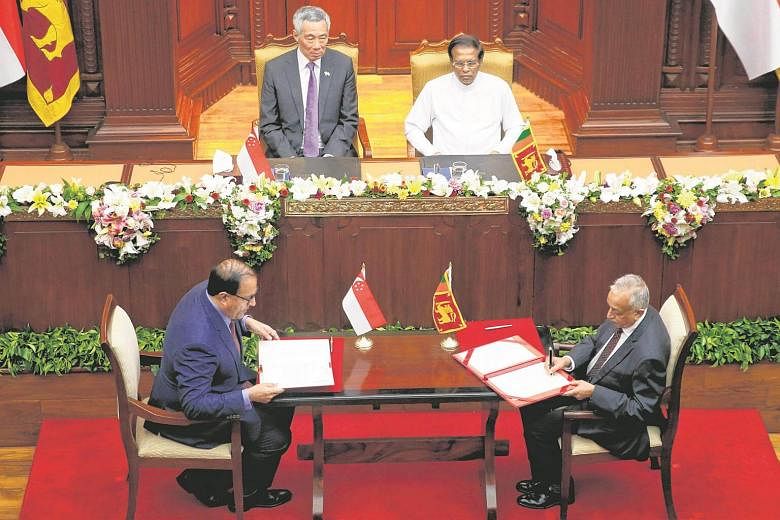SINGAPORE - The free trade pact signed last week between Singapore (Aaa stable) and Sri Lanka (B1 negative) will enhance the cross-border trade of goods and services and promote foreign direct investment (FDI) between the two countries, a credit positive for both, said ratings agency Moody's Investors Service on Monday (Jan 29).
The Sri Lanka-Singapore Free Trade Agreement (SLSFTA) is Singapore's 21st trade agreement with 32 trading partners, and reiterates Singapore's commitment to free and open markets.
"Particularly within the region, the agreement promotes the growth of outward Singaporean investment, helps maintain its strong positive net international investment position (224 per cent of 2016 GDP), and solidifies its strength as a hub for global trade, finance, and logistics," said Moody's.
Singapore also stands to save about S$10 million each year as Sri Lanka will eliminate tariffs on 80 per cent of Singapore's exports over the next 15 years.
But the pact will have a bigger effect on Sri Lanka's credit quality because the potential increase in current account inflows and inward investments would help reduce its elevated external vulnerability, said Moody's.
Because Singapore already does not impose import duties on 99 per cent of the items listed in the tariff schedule for Sri Lankan exports to Singapore, the pact's main trade benefits for Sri Lanka will materialise through the opening of access to the broader Association of South-east Asian Nations (Asean) market and other large economies given Singapore's existing preferential trade arrangements with Australia, Japan, Korea and other countries in South-east Asia, said Moody's.
In 2017, Sri Lanka was Singapore's 37th-largest trading partner, while Singapore was that nation's eighth-largest trading partner. Their bilateral trade amounted to about 0.5 per cent of Singapore's gross domestic product (GDP) and 2.5 per cent of Sri Lanka's.
The extent to which the SLSFTA reduces Sri Lanka's external vulnerability will depend on its effectiveness at bolstering services and investment flows, said Moody's. Sri Lanka's current account has a structural deficit because a large merchandise trade deficit more than offsets a surplus in services and remittance inflows, the agency explained. Moreover, FDI inflows only partially finance the current account shortfall, resulting in a persistent basic balance deficit, it added.
Moody's said the pact is likely to boost Sri Lanka's services receipts, particularly in tourism.
Using travel and passenger transport by air as a proxy, tourism accounts for about three-quarters of the services surplus. Although Singapore comprised less than 1 per cent of Sri Lanka's total tourist arrivals in 2017, the SLSFTA may allow Sri Lanka to leverage Singapore's transportation hub to attract more tourists, said Moody's.
Additionally, there are provisions on the cross-border transfers of information by electronic means and data flows, which could aid Sri Lanka's burgeoning IT services sector, said the agency.
Moody's also expects the agreement to promote direct investment in Sri Lanka by Singapore companies. According to the Sri Lankan government, FDI from Singapore totaled US$658 million (less than 1 per cent of Sri Lanka's GDP) during 2006 to 2017 in sectors such as food manufacturing and real estate. By easing regulation in the services sector, the SLSFTA will broaden the scope of investment to other areas such as infrastructure, logistics, education and healthcare, said Moody's.
The agreement also protects against expropriation, improves transparency through safeguards against discriminatory treatment and provides for a dispute resolution mechanism, all of which create a better investment climate to attract FDI, said the agency.


